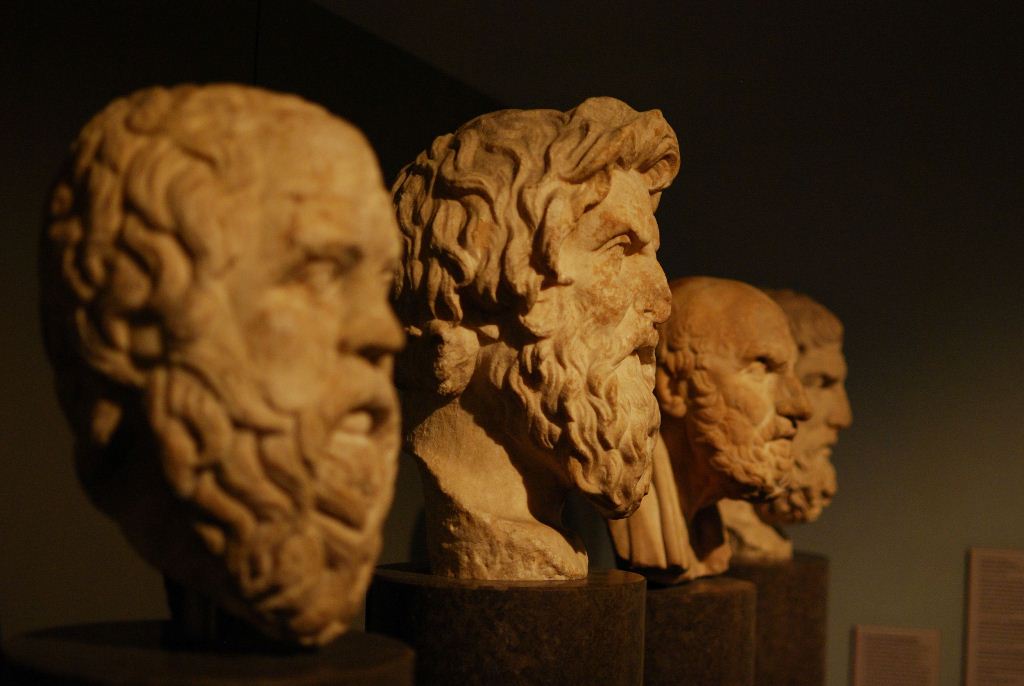
17 Jan 2014 by Tony Dibble-
1. PHILOSOPHY
Philosophy is the love and pursuit of wisdom. This is not the love and pursuit of GOD. It was a pursuit outside of GOD. This was to find out the source and the basis of life. Like the love of sweets, the pursuit of philosophy has its hazards. To the Greeks, philosophy was the highest intellectual pursuit. The Jews did not accord the subject the same standing, though. Bertrand Russell, the Cambridge philosopher, wrote in The Problems of Philosophy (Oxford, OUP, 1971), page 91, “The value of philosophy is, in fact, to be sought largely in its very uncertainty.” Nothing is conclusive in philosophy.

2. SCRIPTURE AND PHILOSOPHY
There is a serious warning about philosophy in Colossians 2:8 as follows:
“See to it that no one takes you captive through philosophy and empty deception, according to the tradition of men, according to the elementary principles of the world, rather than according to Christ.”
- Firstly, we are warned to be on guard, against philosophy.
- Secondly, we could be unduly absorbed in philosophy.
- Thirdly, philosophy is placed in the same category as empty deception (or in other words, nonsense and lies)
- Philosophy is based on tradition and is about the elementary (minor) aspects of existence.
- Philosophy is not from Christ.
Hence, the Christian is to ensure that he is not enslaved by philosophy. He may study or teach the subject, but he is not to be caught up with it, personally. He must have his Spiritual Anchor: Christ.

3. THE CHRISTIAN MIND
The Christian has the mind of Christ (1 Cor 2:16). The mind of Christ focuses on the will of His Father. The will of the Father is that all men be saved through the death of Christ (John 3:16; 6:40). This is the gospel, the good news. The focus of a Christian is the spread of this gospel (Matt 28:18-20). That is why we are asked to be transformed by the renewing of our minds. This is to ‘prove’ or undertake what the will of GOD is (Rom 12:2).The mind of the Christian is not to look at traditional and elementary knowledge. Instead, it is to focus on meeting the will of GOD.
In Matthew 5:8, Christ says that that the pure in heart shall ‘see’ GOD. He had nothing to say about philosophers being able to do this.

4. CHALLENGES TO THE SPREAD OF THE GOSPEL
The challenges to the spread of the gospel include philosophies and associated concepts as follows:
4.1. Anti-GOD approaches
Atheism
An atheist ‘believes’ that GOD does not exist. He fails to understand that his error is in a finite (limited) being trying to understand/prove that an infinite (unlimited) being does not exist. The atheist is sometimes considered a person who ‘refuses’ to believe in the existence of GOD. If pressed, he may possibly admit that he is really an agnostic.
Agnosticism
The agnostic feels that the existence or non-existence of GOD cannot be proven either way. He considers this matter of little relevance.
Free thinking
A free thinker has an open mind. This means that he has not thought deeply enough about the matter of GOD’s existence. He does not want his thinking to arrive at any conclusion. He is perhaps afraid of being classified as having this, or that sort of mind. It usually implies that he wants to be ‘freed’ from thinking. He wants to be freed from the act as well as the personal and social consequences of thinking.
The act of thinking may give rise to a mind-boggling exercise. The personal consequence is having found GOD, he then has to relate to Him. The social consequence is being treated an outcast by the pragmatic world, if he were to believe in GOD.

4.2. Religious Preferences
Pluralism
The pluralist believes that all religions lead to salvation. He really supports none. Some of the ‘religions’ may only be ethical and moral systems of conduct. The pluralist is never on solid ground. If pushed, he would possibly sympathise with the atheist, the agnostic or even the free thinker.
Syncretism
The syncretic would combine the beliefs and worship practices from a number of religions and make them into his single religion. This he does from his own preferences. He considers his selection to be the fairest combination. He, not GOD, decides on the content of his belief system.

4.3. Common Philosophies
Humanism
Humanism considers the development of man’s potential the sole aim in this life. A man is to act for the ‘good’ of his fellow beings. The record of man’s violence and intimidation towards his neighbour simply grows as the world’s population multiplies. This is a clear indictment against humanism as an effective philosophy.
Humanism ultimately considers man his own ‘god’. This is contrary to the gospel. The gospel teaches that a man must ultimately lose himself to find GOD, through Christ (Luke 14:27; I Cor 15:31). He has to be Christ in essence. This is what the abiding presence of GOD (John 15:5) and the indwelling of the Holy Spirit (1 Cor 3:16) are about.
Utilitarianism
Utilitarianism holds that an act is acceptable if it benefits the most number of persons and gives them the greatest happiness possible. Man decides that an action is valid. GOD is not entered into the equation. It matters nothing to the utilitarian whether GOD’s standards are maintained or breached.
This is against the Christian approach. To the Christian, an action is acceptable if it is:
- within the will of GOD, and particularly if men are to be saved (1Tim 2:3 & 4); and
- done for the glory of GOD (1 Cor 10:31)

Liberalism
Liberals, generally believe that GOD exists but believe that they may think and act independently of Him, within their own concept of reason. Reason, as opposed to GOD, is their basis of conduct. Their cold head rather than the warm heart or the refreshing spirit is in the driving seat. Any basis of action outside of GOD is really what it is—outside of GOD.
Hedonism
This is the pursuit of pleasure as the main aim in life. Lust and its fulfilment then becomes a person’s god. A man’s god is his own belly. Such an approach is against scripture as explained in 1 John 2:15-17.These verses are a total denunciation of lust.
Evolution
Some scientists maintain that man has evolved from lower forms of life. This has not been proven and can never be proven as time has passed us by. It is a theory and not a law.
There are also those who are not scientists who blindly accept the theory as valid.

“Death” of GOD
Some maintain that philosophers have proven that GOD does not exist. This is incorrect. Philosophy studies the traditional arguments for the existence of GOD and exposes philosophy’s own limitations of the process. Philosophy is not ‘built’ to conceive GOD.
Apathy about Spiritual Matters
There are people who have not prayed but who are ready to maintain that GOD does not exist. This is the equivalent of saying that someone does not exist merely because he was not contacted.
There are also those who have not read the Bible nor studied it but are quick to maintain that it is a book of fables. This again is the equivalent of saying that the journey was unenjoyable without having taken the trip.
Gross ignorance, arising from apathy about spiritual matters, is never a basis to take positions on the critical issues in life.

CONCLUSION
GOD has told us that If we plan to find Him, we would find Him but only if we searched for Him with all our heart (Jer 29:12-14).This again echoes Matthew 5:8—the pure in heart shall see GOD.
We must understand four requirements here:
i) We must be totally ready to meet GOD and not just take a light-view of the prospect;
ii) The search could be interesting and we could be side-tracked: but we must stay focused on the goal of getting to find, and to relate to GOD;
iii) The search must be whole-hearted as GOD demands in verse 13, and it must not be a half-hearted effort;
iv) We must pray as GOD directs us in verse 12, since the search is not an intellectual exercise—GOD is not a concept but a person we relate to, and we are after nothing short of Him.

Note: Tony Dibble worships at Endeavour Christian Gathering, in Perth, Western Australia. Prior to this, he was attending the Church of Our Holy Saviour, Labuan, East Malaysia. When in Kuala Lumpur, he worships at Faith Oasis Fellowship (FOF) Subang Jaya, Selangor.
| Share the Good News |




Leave a Reply